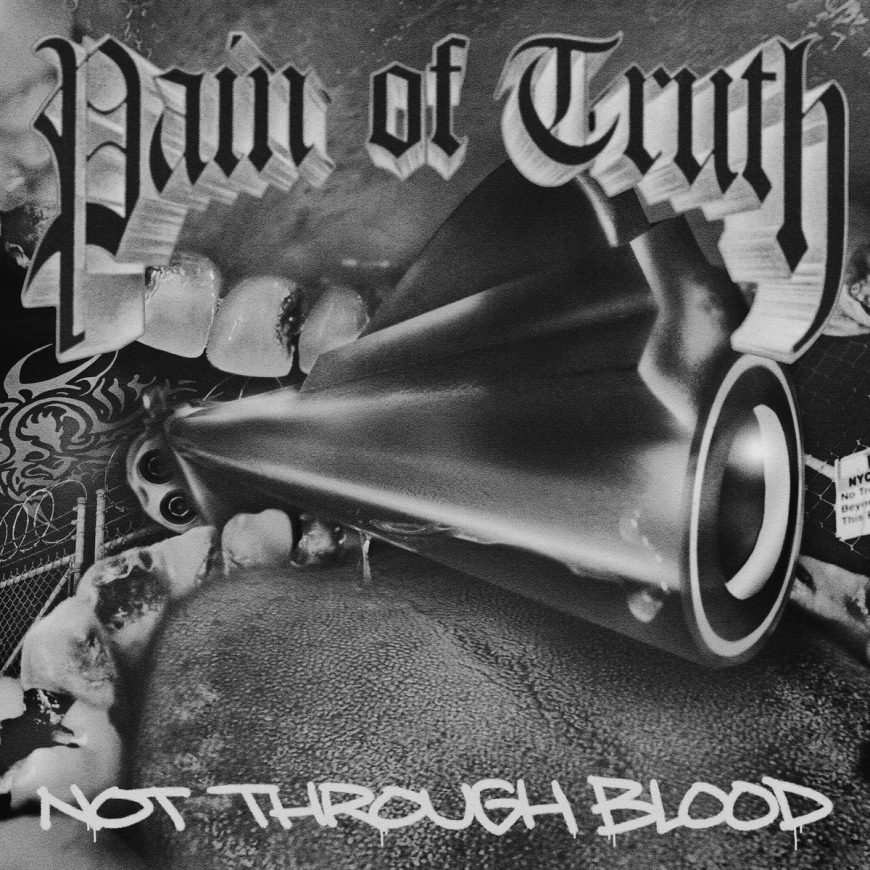Listen Up, Nerds 43: The Pain of Truth

This isn’t a review.
I’m not reviewing the new Pain of Truth album.
I have no interest in assigning a score or mentioning the quality of the Pain of Truth album. Hell, I don’t even like this kind of Hardcore all that much. It’s a far cry from the youth crew I listen to on a daily basis. The album is a big deal, and rightfully so, but it’s a hardcore record. It’s a Hardcore record. It’s capital H Hardcore through and through. It’s everything that Tom Breihan’s review says that it is. It’s a little lyrically redundant but never not exciting. It’s not for newcomers, it’s for Hardcore fans. It’s everything you’ve heard before but somehow more. And that’s what I want to talk about.
This is another “What We Talk About When We Talk About X”-type column. I want to talk about Not Through Blood as the Hardcore Record. Hardcore, with the capital H here, is a somewhat predictable genre. There are lyrics about betrayals (real and imagined), heavy parts, solos, two-step parts, etc. What I didn’t predict about this record is that it was going to be the purest Hardcore record to date.
Capital-H Hardcore is a genre in and of itself. It’s different than hardcore punk or the catchall genre of “hardcore.” There’s something about Hardcore that is bigger, grander, and bolder than every other subgenre in the big diagram of hardcore. The Pain of Truth album is a Hardcore album. It is the dictionary definition of a Hardcore record. There’s something in that name that’s already getting ahead of me. The phrase, “Pain of Truth,” is already postmodern and existentialist in a way Baudrillard anticipated in Simulacra and Simulation:
“The simulacrum is never that which conceals the truth—it is the truth which conceals that there is none. The simulacrum is true.”
There is no truth until a simulacrum exists, and in this sense, the Pain of Truth album is a simulacrum of a Hardcore album. It is the most Hardcore Hardcore album of all time. This isn’t to say that it’s the best, the heaviest, or the most impactful, but this record is the pure distillation of every Hardcore release from the past 30+ years.
If there’s a record that I’d say does reach those highs of best/heaviest/most impactful/most influential, it’s Big Kiss Goodnight by Trapped Under Ice. That album is the high-water mark for Hardcore. There are albums I like more, but the legacy it has, the fact that everyone has been chasing its glory for 12 years, makes it the undisputable king of Hardcore records. TUI caught lightning in a bottle and was in the right place at the right time, but that’s sometimes what it takes. There are tropes that BKG uses, calling cards that appear on every Hardcore record, but it’s very much the work of an individual unit.
The art on BKG and Not Through Blood is unmistakably Hardcore. BKG's traditional tattoo-inspired cross and NTB's POINT OF VIEW: YOUR UVULA WHILE THERE IS A GUN IN YOUR MOUTH are about as Hardcore as you can get, but NTB twists the dial up a notch. Both use irreverent sound clips, BKG uses Johnny Depp from Cry-Baby (1990) and NTB uses, by god, Paul (2011). Neither are the first to use sound clips, but NTB's use of, out of every single movie in the world, PAUL, THE SIMON PEGG MOVIE ABOUT AN ALIEN, RELEASED IN 2011 AND SUBSEQUENTLY LOCKED IN THE BASEMENT OF YOUR MEMORIES. If this movie means a lot to someone who made this record, I get it, but I never would've anticipated this as the source of a sound clip on a Hardcore record this year. Is this record copying BKG? Absolutely not. To Hardcore fans, these sound completely different. To suggest otherwise is ridiculous, but I don't think it's ridiculous to mention that they use some of the same symbols and give listeners similar experiences.
The Pain Of Truth record is thought-provoking because it is not the work of an individual unit, it has features on every single song. It’s a team effort from some of the biggest names in their scene as well as the Hardcore scene in general. On the other hand, there are two characters in the entire album. There’s You, and there’s Me. There’s an “us” on one song, but for the most part, this is a record about the only two people that a Hardcore record could be about: You and Me. The essence of Hardcore is two words and they are “Fuck you.” There are two people in that sentence: You, who I am saying "Fuck" to, and Me, who says "Fuck you." There are reasons and there is context but this entire genre is built off of those words and the Pain of Truth album is the most “Fuck You” record I’ve ever heard.
By this virtue of being the most Hardcore record of all time, is it the best?
Allow me very quickly to relate this to something a little less intimidating than Hardcore: Imagine a chocolate chip cookie. There's a very popular YouTube video that came out at the beginning of summer, where a chemist uses ingredients from the International Order of Standards to make chocolate chip cookies. He uses 100% pure chocolate, he uses 100% pure coconut oil, he uses 100% pure flour, and makes a couple of cookies out of it. Now, these are not the most attractive-looking cookies, these are not the most tasty cookies, but they are the purest cookies. They are the most Chocolate Chip Cookies to ever exist. They're not the chocolate chip cookie that most people think of, but that's because impurities and other chemicals make the chocolate chip cookie you imagined in your mind. There are all sorts of imperfections that make music better and worse, and that's what makes art cool. But, there's something to be cherished about something so purely concocted, almost as if it was in a lab, to be a Hardcore record.
So do I think that the Pain of Truth record is the best hardcore record of all time? I don't. I don't think it's the best. I think it's a good record. I think it's the biggest release this year in terms of hype and in terms of scale. We’ve been building to this for so long, and now we’re here. There is a Self Defense Family shirt that says, “Reject theoretical criticism, ask yourself 'Is this good?'” I asked myself if this record is good and I think it's a good record but I don't think that's the reason to talk about this record.
I think that sometimes it's not valuable to talk about whether a record is good or not. I think that, sometimes, it's appropriate to eschew a rating in order to make a point about a record. if I don't make a point about a record and what it means, in the grand scheme of it all, more people might skip over it. Music journalists have to churn out a lot of work to stay current and that's not their fault, they have to stay current because that's what readers want. I do imagine that if we talked about records in the realm of what they mean to us and to their genre or the scene at large, rather than if they're good or not, we might be able to give them a little more space in our brain to praise them for making us think. I'd hate to listen to this record three times, say, "Well it's not doing anything new," and move on because I missed the point of this record, which is to be Hardcore.
This newsletter is about the context and about the media that we choose to consume and this is a 30,000ft view of Hardcore because getting into the weeds about a record like this doesn't do it a ton of favors. I would rather look at the landscape than the blades of grass here. It's like an impressionist painting or a comic book where if you use a microscope, all you see is dots. But when you zoom out, you can see the big picture and the big picture here is that this is the most Hardcore record of all time. It’s the Hardcore Record of record.

Comments ()